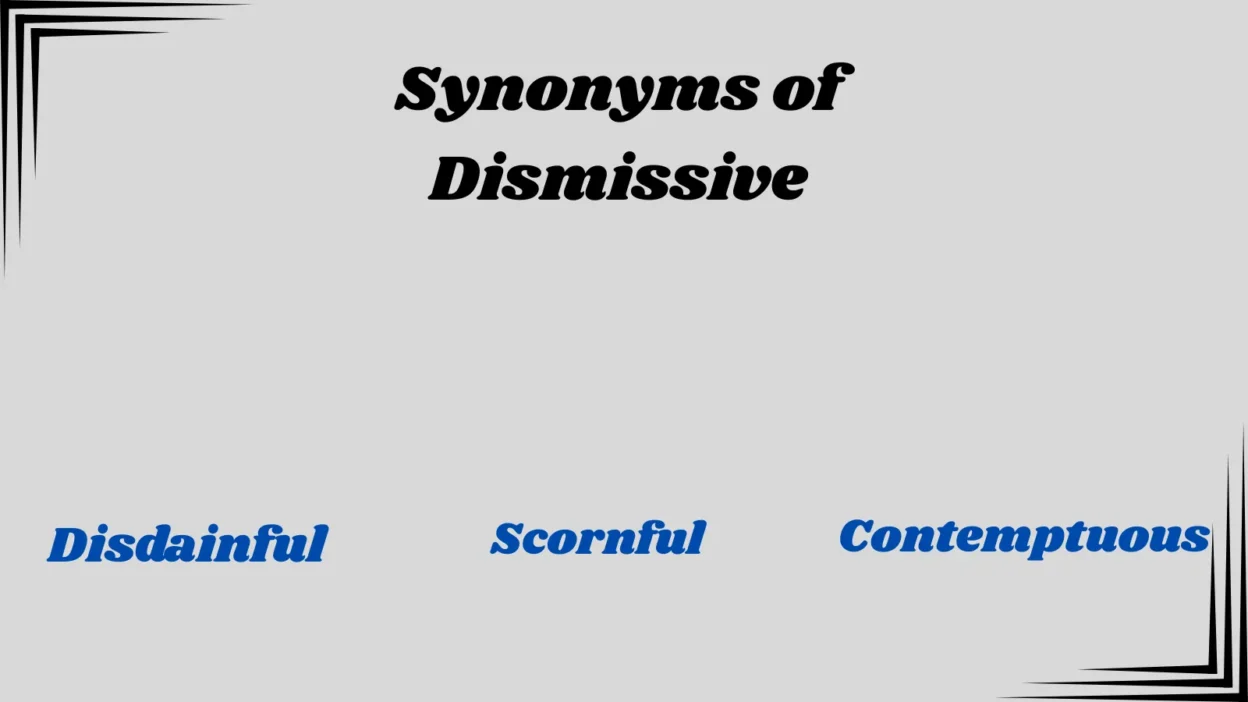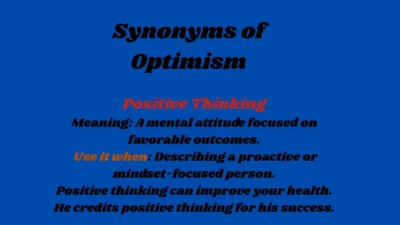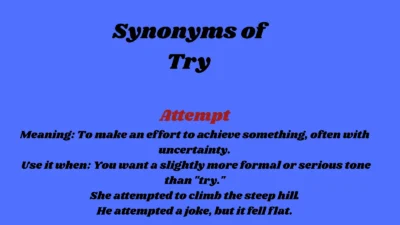Synonyms of dismissive help describe an attitude that shows disregard, lack of respect, or indifference, such as condescending, scornful, or curt. For example, he gave a dismissive wave when asked about the problem, making it clear he didn’t care.
If you’re writing about conversations, attitudes, or behaviors, another word for dismissive brings your descriptions to life with clarity and impact.
In this article, you’ll get the meaning and example sentence for each dismissive synonym, so that you can describe tone, attitude, or reactions with confidence and precision.
What Does Dismissive Mean?
Dismissive refers to showing a lack of interest, respect, or seriousness toward something or someone. It’s often:
- Indifferent or unconcerned
- Slightly arrogant or condescending
- Cold and detached
- Used to minimize or brush off others
Think of dismissive as an attitude that closes the door on dialogue, often with a shrug, smirk, or sharp word.
Synonyms & Related Words for Dismissive (And When to Use Them)
1. Contemptuous
Meaning: Expressing deep disdain or scorn.
Use it when: You want to show strong disapproval with a bitter edge.
- She shot him a contemptuous glare.
- His voice was contemptuous when he spoke of the plan.
2. Scornful
Meaning: Openly mocking or showing a lack of respect.
Use it when: The attitude is vocal, public, or dramatic.
- He gave a scornful laugh.
- The critic’s review was scornful and cutting.
3. Disdainful
Meaning: Showing arrogant or aloof rejection.
Use it when: There’s an air of superiority.
- She gave a disdainful glance at the suggestion.
- His tone was disdainful, as if the task was beneath him.
4. Derisive
Meaning: Expressing ridicule or mockery.
Use it when: There’s sarcasm or biting humor involved.
- Her derisive comments silenced the room.
- He offered a derisive snort in response.
5. Aloof
Meaning: Emotionally distant or indifferent.
Use it when: You want to show cool detachment, not outright rejection.
- He remained aloof, unwilling to engage.
- She seemed aloof throughout the conversation.
6. Snide
Meaning: Indirectly mocking or insulting.
Use it when: The dismissiveness is subtle or underhanded.
- He made a snide remark about her credentials.
- That snide comment didn’t go unnoticed.
7. Cold
Meaning: Lacking warmth, emotion, or friendliness.
Use it when: You want to highlight emotional indifference.
- Her cold response hurt more than she realized.
- He delivered the news in a cold, clinical tone.
8. Curt
Meaning: Rudely brief or abrupt.
Use it when: Someone cuts off a conversation or answers harshly.
- His curt reply ended the discussion.
- She gave a curt nod and walked away.
9. Blunt
Meaning: Straightforward to the point of rudeness.
Use it when: Someone is being harsh rather than subtle.
- He was blunt about her chances.
- Her blunt dismissal left no room for doubt.
10. Uninterested
Meaning: Showing no curiosity or concern.
Use it when: The dismissiveness is passive rather than aggressive.
- He seemed uninterested in the presentation.
- Her uninterested gaze drifted to her phone.
11. Indifferent
Meaning: Not caring one way or the other.
Use it when: Neutrality feels emotionally detached.
- He was indifferent to the outcome.
- She remained indifferent to his concerns.
12. Dismissal-prone
Meaning: Habitually inclined to reject or ignore ideas.
Use it when: You’re describing a pattern or habit.
- His dismissal-prone attitude made collaboration difficult.
- She’s dismissal-prone when ideas aren’t her own.
13. Condescending
Meaning: Acting as though others are inferior.
Use it when: Dismissiveness comes with superiority.
- His condescending smile said it all.
- She spoke in a condescending tone that angered the team.
14. Patronizing
Meaning: Treating someone with fake kindness that hides superiority.
Use it when: Dismissiveness is disguised as politeness.
- His patronizing advice made her bristle.
- “Nice try,” he said in a patronizing tone.
15. Offhand
Meaning: Casual to the point of seeming rude.
Use it when: Something is said without much care or thought.
- He gave an offhand comment that felt dismissive.
- Her offhand attitude irritated the client.
16. Flippant
Meaning: Not taking things seriously.
Use it when: Dismissiveness has a joking or careless tone.
- His flippant remark annoyed everyone.
- She gave a flippant response to a serious question.
17. Minimizing
Meaning: Making something seem less important than it is.
Use it when: Dismissiveness comes through downplaying.
- He was minimizing her concerns.
- That comment minimized the issue at hand.
18. Neglectful
Meaning: Failing to give attention or care.
Use it when: Ignoring something important.
- The manager was neglectful of the team’s feedback.
- His neglectful attitude frustrated the group.
19. Insensitive
Meaning: Lacking concern for others’ feelings.
Use it when: Dismissiveness is emotionally tone-deaf.
- Her insensitive comment hit a nerve.
- He was insensitive to their disappointment.
20. Sarcastic
Meaning: Using irony to mock or show contempt.
Use it when: Tone is mocking rather than serious.
- “Oh, brilliant idea,” she said sarcastically.
- His sarcastic tone made it clear he didn’t care.
21. Skeptical
Meaning: Doubtful or disbelieving.
Use it when: Doubt is dismissive rather than inquisitive.
- He gave a skeptical look at the proposal.
- Her skeptical tone shut down the conversation.
22. Brusque
Meaning: Abrupt and unfriendly.
Use it when: You want to show rough or rude interaction.
- His brusque manner put people off.
- She offered a brusque handshake.
23. Haughty
Meaning: Arrogantly superior and disdainful.
Use it when: The attitude feels snobbish or elite.
- He gave a haughty smirk.
- Her haughty air filled the room.
24. Unresponsive
Meaning: Not reacting or acknowledging.
Use it when: Silence or inaction signals dismissal.
- He remained unresponsive to questions.
- She was unresponsive throughout the meeting.
25. Inconsiderate
Meaning: Not thinking about others’ feelings.
Use it when: Dismissiveness is thoughtless.
- That was an inconsiderate thing to say.
- He was inconsiderate of her time.
26. Detached
Meaning: Emotionally uninvolved or distant.
Use it when: You want to highlight emotional disengagement.
- He gave a detached analysis.
- Her detached attitude hurt their relationship.
27. Negating
Meaning: Denying or rejecting something’s importance.
Use it when: You want to show active rejection.
- He negated every idea I proposed.
- Her response negated the entire argument.
28. Overlooking
Meaning: Failing to notice or consider.
Use it when: Dismissiveness happens by omission.
- They overlooked key evidence.
- She felt overlooked in the discussion.
29. Rejecting
Meaning: Refusing to accept.
Use it when: You want to show firm opposition.
- He rejected her suggestion outright.
- The board was rejecting all outside input.
30. Invalidating
Meaning: Undermining or denying someone’s feelings or experience.
Use it when: Dismissiveness causes emotional harm.
- She felt invalidated by his comment.
- His response was emotionally invalidating.
How to Choose the Right Synonym
Consider the Tone:
- Harsh or Direct: Blunt, brusque, rejecting
- Cold or Distant: Aloof, detached, unresponsive
- Mocking or Sarcastic: Snide, sarcastic, flippant
Think About the Intent:
- Emotional Harm: Invalidating, patronizing, condescending
- Passive Dismissal: Overlooking, indifferent, uninterested
- Active Rejection: Contemptuous, disdainful, negating
Watch for Cultural and Emotional Contexts:
Words like patronizing or invalidating are especially important in discussions about relationships or mental health, while terms like brusque or offhand might appear in professional feedback or character descriptions.
Conclusion:
Understanding the many synonyms of dismissive allows you to better capture the tone, attitude, or emotion behind moments of disregard or indifference.
Now that you’ve explored the nuances behind each word, you can choose one of the dismissive synonyms that fits your context with greater accuracy.
Let your word choice reflect not just meaning, but intention—because even a simple brush-off can speak volumes.





